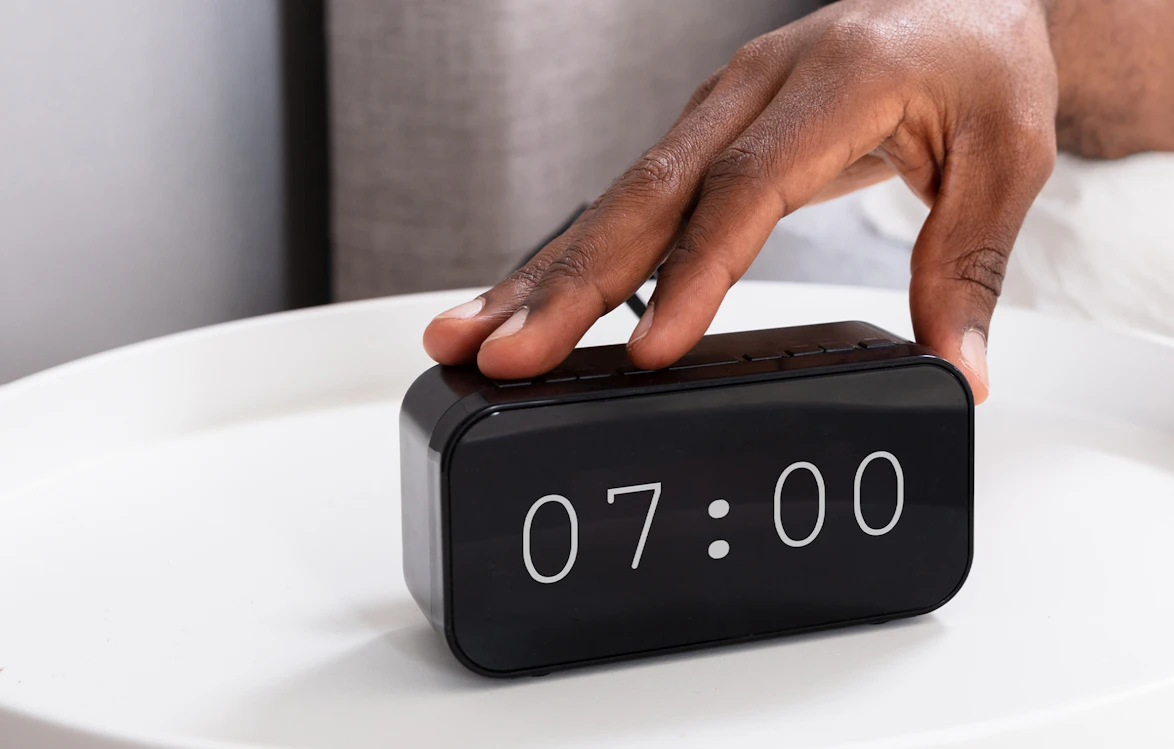Time to read : 5 min
You snooze, you lose (for real)
If snoozing was an Olympic sport, many would have already won gold. Turning over one more time is tempting, every day, but snoozing isn't actually that good for you. Read on to find out why it's better to get up right away and how to make it happen.
Why you're better off not snoozing:
1. You have less energy
During your sleep, your body goes through different sleep cycles. A sleep cycle lasts about 90-100 minutes and progresses from light to deep sleep.
When you hit the snooze button, you trigger your body to enter a new sleep phase. However, you don't complete this cycle (unless you stay in bed for another 1.5 hours). What you get is fragmented sleep, making you even groggier and making it harder to get up.
2. It reduces your performance
If you need an alarm clock, your sleep is interrupted, and there's a good chance your body isn't ready to wake up. Sleep inertia can lead to fatigue, drowsiness, disorientation, and reduced (mental) performance.
3. It disrupts your biological clock
If you sleep well, you shouldn't feel the need to snooze further.
Some people naturally need more sleep or go to bed later, but many people have a disrupted sleep pattern, often going to bed (too) late and needing an alarm clock to wake up in the morning.
It's a good idea to reflect on whether you're sleeping well. Do you have a regular sleep routine? Do you go to bed and wake up at the same time every day? Creating consistency and a regular sleep pattern is important for your health and your biological clock.
How do you stop yourself from hitting snooze?
Struggling to get going in the morning? Here are 7 tips to get out of bed easier and kickstart your day.
1. Let there be light
Light plays a big role in setting your internal clock. That's why you want to dim the lights and avoid (blue) light in the evening as much as possible. But during the day, get outside and soak up that direct sunlight. It signals your brain that it's daytime. Not only does this make it easier to get out of bed in the morning, but it also helps you fall asleep better at night because your body produces more sleep hormones.
2. Take a deep breath
Your breathing affects your nervous system. Take a few deep breaths to activate the (sympathetic) part of your nervous system. This part is responsible for action, giving you that extra bit of energy to throw off the covers.
3. Just get up!
If snoozing has become a habit, you can break it. Train your brain to get up right away. One effective way is to convince yourself to get up by counting down and then taking action. Your brain is sensitive to this, and you'll see how well it works: 5-4-3-2-1, get up!
4. Do stretches
Movement is great for your body and keeps it nimble and flexible. Starting your day with a few stretching exercises will shake you awake. Stretching also helps get the blood flowing to your muscles, reducing stiffness after lying in bed all night.
5. Take a cold shower
Still feeling sluggish? Hop in the shower and turn on that cold water! It triggers the production of adrenaline, giving you an instant energy boost and making you more alert.
6. Drink water
Our bodies need sufficient hydration to function properly. Overnight, we lose a lot of fluids, essentially becoming somewhat dehydrated as we sleep.
So, right after waking up, drink a few large glasses of water to replenish your fluids. Adding some lemon juice or mint can give you an extra kick.
7. Eat a protein-rich breakfast
Want to kickstart your day right? A complete protein-rich breakfast is always a good way to begin. If you struggle with breakfast in the morning or have limited time, our Orangefit Hero could be an ideal solution for you.
